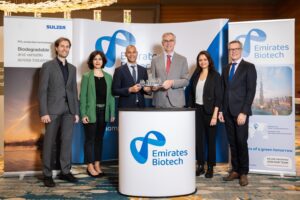Sulzer Ltd. (Winterthur, Switzerland) announced that its technology has been selected by Emirates Biotech for its upcoming Polylactic Acid (PLA) production plant in the United Arab Emirates. The facility will be constructed in two phases, each with an annual capacity of 80,000 tons, resulting in a total production capacity of 160,000 metric tons per year (m.t./yr). Once completed, it will be the largest PLA production facility in the world.
PLA offers a sustainable alternative to traditional plastics. It is widely used in applications such as packaging, disposable utensils, helping to reduce reliance on single-use plastics across the globe. Emirates Biotech will leverage Sulzer’s licensed PLA technology to manage all production steps from a single location, including lactide production, purification and polymerization. The facility will also use a plant-based feedstock to produce high-quality PLA bioplastics at scale, positioning the Middle East as a key player in the bioplastics industry.

From left to right: Alex Battu, Sulzer, Hoda Torkashvand, Sulzer, Emmanuel Rapendy, Sulzer, Marc Verbruggen, Emirates Biotech (CEO), Aman Kulshrestha, Emirates Biotech, François de Bie, Emirates Biotech (CCO) Source: Sulzer
Thanks to its strong track record in the bioplastics sector, Sulzer’s licensed PLA technology is already in use at most PLA facilities worldwide. This new development strengthens Sulzer’s commitment to supporting global industry in adopting circular manufacturing and building a more prosperous and sustainable society.
Located in the United Arab Emirates, construction is set to commence in 2025, with the plant expected to be operational by early 2028. The facility will use Lactic Acid (LA) as its feedstock to produce PLA, offering low carbon footprint and biodegradable alternatives to conventional plastics, further contributing to the circular economy.
Tim Schulten, Division President of Chemtech, said: “We are thrilled to collaborate with Emirates Biotech on this groundbreaking project. By bringing our advanced PLA production technology to the UAE, we are supporting the region’s transition to more sustainable materials and contributing to a greener future.”
Emmanuel Rapendy, Global Head Polymers and Crystallization for Sulzer Chemtech continued: “With environmental challenges highlighting the need for the global adoption of biopolymers, this is an extremely important project that reflects our ethos of tackling sustainability from the ground up. Our technologies not only enable cleaner processes and end products but also ensure that our equipment and systems have a very high degree of efficiency, limiting the energy input required for operation.”
Marc Verbruggen, CEO of Emirates Biotech, said: “Our partnership with Sulzer marks a key milestone in our journey to establish a world-class PLA production facility. Sulzer’s expertise and innovative solutions will be crucial in achieving our vision of leading the biopolymer industry while contributing to a more sustainable future.
Sheikh Suhail Al Maktoum, a key shareholder of Emirates Biotech, commented: “This project highlights our commitment to sustainability and economic diversification. By leveraging innovative technologies and strategic partnerships, we aim to establish the UAE as a global leader in the production of eco-friendly materials.”
Dorus Everwijn President of GBI, a key shareholder of Emirates Biotech, added: “We are proud to collaborate with Sulzer on this groundbreaking project. Sulzer’s advanced technologies and extensive experience in the PLA industry will support the development of a state-of-the-art PLA production facility, setting new benchmarks.”
As the global demand for PLA continues to rise, driven by environmental concerns and the shift towards sustainable materials, this facility will position the Middle East as a key player in the bioplastics industry, supporting regional and global efforts to combat plastic pollution.